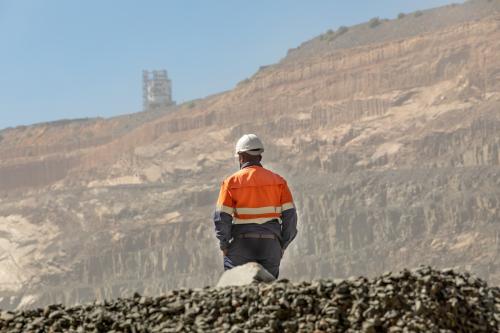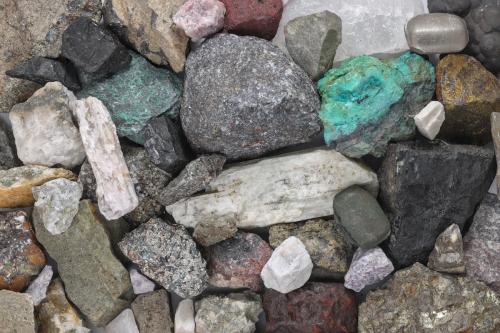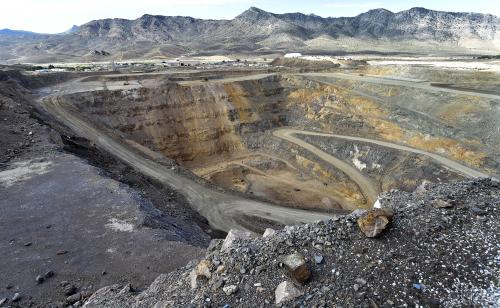China has recently imposed export restrictions on rare earth elements in response to U.S. tariff increases on Chinese products. Even if the restrictions are fully lifted, the vulnerability of the critical minerals value chain for U.S. industries that depend on these inputs remains. The options discussed for alternative sources of critical minerals, including Ukraine, Greenland, and Canada, are complex or unfeasible in the short term.
On March 20, 2025, the Trump administration moved to strengthen America’s resource base through an executive order promoting increased domestic mineral production. The actions listed are very important but may be insufficient to respond to the current critical minerals crisis at the speed needed and with the volumes required for the defense, automotive, electronics, and energy sectors.
The answer to American critical minerals needs? Africa.
The Africa Growth Initiative at Brookings has been researching the opportunities Africa can offer the U.S. in the critical minerals sector. We have benefited from input received in two roundtables with African and U.S. representatives from government, industry, academia, the African Development Bank (AfDB), and the World Bank. In this three-blog series, we summarize our findings and recommendations.
Africa is estimated to hold about 30% of the world’s proven critical minerals reserves. This number is likely an underestimate of the regional potential due to insufficient geological exploration. Several African countries are global leaders in reserves, from cobalt in the Democratic Republic of the Congo (DRC) to platinum group metals in South Africa and graphite in Mozambique.
African leaders have woken up to the enormous opportunity that critical minerals can provide to their countries. The December 2024 African Union Green Minerals Strategy is a milestone document in the sector. The level of political attention could not be higher.
The business opportunities in the African energy and infrastructure sectors for American companies, in combination with mining development, are significant. The mining sector’s high energy demand and African countries’ enormous needs for household and industrial energy clients are the basis for commercial opportunities. Concessions for railways and ports that would serve the mining transportation corridors and export routes also offer investment opportunities. The initial processing steps of minerals in the countries or subregions where the mining is done are a third opportunity area. This combined package of investments is a unique opportunity for U.S. companies.
African countries have been doing their homework on governance and transparency. Countries including Guinea, Ghana, the DRC, Nigeria, and Tanzania have made substantial progress in the 2021 Resource Governance Index. Further, the Extractive Industries Transparency 2024 evaluation shows progress in several African countries.
What can the US do to access Africa’s critical minerals faster?
We propose six recommendations for the U.S. government and corporations to engage with African countries for faster access to critical minerals in a sustainable, long-term partnership that generates jobs and economic growth in Africa.
- U.S. foreign policy toward Africa should include mineral diplomacy. Competition for critical minerals in Africa is growing. While China’s presence is better known, other actors like India, Saudi Arabia, and the European Union are entering the continent’s mining sector. The April 2025 visit to the DRC by the U.S. senior adviser for Africa is an example of the initial efforts of mineral diplomacy.
- The critical minerals opportunity in Africa cannot be seen only as a mining issue. Making the most of this opportunity requires a coordinated interagency effort involving the Development Finance Corporation, U.S. Trade Development Agency, Export-Import Bank of the United States, Department of Energy, Treasury, Commerce Department, U.S. Geological Survey (USGS), and, of course, the State Department. Each agency has a clear and complementary mandate, and together, they can form a coherent platform for sustained and strategic engagement with Africa. The U.S. Congress also has a critical role to play in providing legislative direction and resources for successful implementation of this approach.
Of these agencies, the USGS needs to be mobilized and supplemented with the deep geological expertise of universities and companies to understand the critical minerals landscape in Africa. Expensive mining investments will only happen if there is clear information on ore grade, size of deposits, quality of by-products, and many other factors.
- Mineral diplomacy without the private sector will fail. The private sector can pinpoint the most significant governance, financial, and social risks and untapped investment opportunities with regard to critical minerals. Additionally, corporations can identify the specific support they need, from investment support to guarantees and trade barrier elimination.
- The U.S. government should leverage its financial and capital contributions to international financial institutions—such as the World Bank Group (including the International Finance Corporation and Multilateral Investment Guarantee Agency), the African Development Bank (AfDB), and the International Monetary Fund—to mobilize their financial and technical assistance to support these endeavors. They can work with national development banks and sovereign wealth funds to provide coordinated concessional and blended finance platforms.
The Lobito Corridor is a good example of U.S. multiagency coordination with the AfDB and the Africa Finance Corporation. Over $3 billion in railway, energy, logistics, and complementary investments have been mobilized. However, the participation of American mining, energy, and infrastructure asset management companies could have been higher.
- U.S. private mining companies could acquire existing mines in Africa that are causing significant environmental and social damage to upgrade and operate them to international standards that protect communities and the environment. The region should not accept operators’ substandard performance. African countries can leverage the know-how and experience of American companies in this area for safe and profitable mining operations. This approach would accelerate U.S. access to critical minerals in the region.
- Mining critical minerals is insufficient to secure the inputs that American industries need. Instead of relying on Chinese processing facilities, the U.S. should consider the opportunity to do part of that processing in Africa, where the permitting and construction could be negotiated as part of the investment package. African countries are committed to moving up the value chain.
In our future blogs, we will analyze these opportunities from the African perspective and make specific recommendations for African countries to take advantage of their critical minerals deposits for fair deals and sustainable use of the resources generated for jobs and broad-based economic growth. African countries should be prepared to negotiate beneficial terms for access to the critical minerals in their soils.
The Brookings Institution is committed to quality, independence, and impact.
We are supported by a diverse array of funders. In line with our values and policies, each Brookings publication represents the sole views of its author(s).










Commentary
Africa can provide a faster solution to US critical minerals needs
September 22, 2025